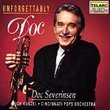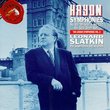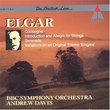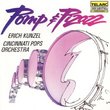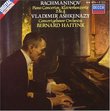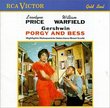| All Artists: Wolfgang Amadeus Mozart, Charles Mackerras, Prague Chamber Orchestra Title: Mozart: Symphonies Nos. 36 & 38 Members Wishing: 0 Total Copies: 0 Label: Telarc Release Date: 4/22/2003 Genre: Classical Styles: Historical Periods, Classical (c.1770-1830), Symphonies Number of Discs: 1 SwapaCD Credits: 1 UPC: 089408014826 |
Search - Wolfgang Amadeus Mozart, Charles Mackerras, Prague Chamber Orchestra :: Mozart: Symphonies Nos. 36 & 38
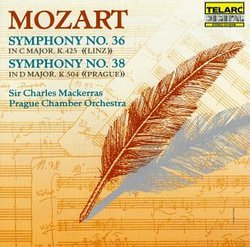 | Wolfgang Amadeus Mozart, Charles Mackerras, Prague Chamber Orchestra Mozart: Symphonies Nos. 36 & 38 Genre: Classical
Mozart's 36th and 38th symphonies are both named after the cities in which they were first performed: Linz and Prague, respectively. It's wholly appropriate, then, to have the Prague Chamber Orchestra in No. 38, although t... more » |
Larger Image |
CD DetailsSynopsis
Amazon.com Mozart's 36th and 38th symphonies are both named after the cities in which they were first performed: Linz and Prague, respectively. It's wholly appropriate, then, to have the Prague Chamber Orchestra in No. 38, although the truth is they do No. 36 just as well, of course. These effervescent performances offer a refreshing view of both works, and Telarc's sound is superb. Lovely. --David Hurwitz Similarly Requested CDs
|
CD ReviewsMackerras never disappoints John Harrington | anywhere, USA | 01/13/2000 (5 out of 5 stars) "I agree with the unidentified music fan below in his rave for this recording, particularly his comments about the Prague, which is the recording that first drew me to Mackerras' Mozart symphonies. The first movement of the Linz *is* slower than you might expect, given Mackerras' break neck tempi elsewhere (e.g., the last mvt of the Linz and the first of the Prague), but I wouldn't say the tempo is problematic in the least. In fact, the adagio introduction is a little on the quick side, while the subsequent allegro seems well-paced. Mackerras' interpretations are crisp and contrapuntally clear; tempi are in general brisk -- in short everything you'd expect from a "period instrument" recording, except without the period instruments. Those who like "historically informed performance" (HIP) recordings will appreciate this and will not miss the authentic instruments. The bonus, and what makes these recordings rise above the burgeoning number of HIP Mozart recordings, is Mackerras' attention to phrasing and articulation. A couple of examples: conductors seem to traditionally shy away from Mozart's sforzandi (e.g., Walter's recordings), perhaps thinking them too kitchy. Mackerras' and the Prague CO's sforzandi are always present, clear and expertly articulated. Also, Mackerras' clarity brings out details that are sometimes lacking in other recordings, like the moment in the Prague, in the minor inflected version of the second theme of mvmt 1 where the two bassoon answer the strings. The bassoons ring out clearly and are balanced with the rest of the orchestra such that they become almost soloists. Listen to Walter, Horenstein, Karajan, Bohm, even Hogwood -- all seem to consider this crucial moment to be "background", and the bassoons are balanced accordingly softly. But there are many other examples -- in every bar there seems to be a surprise.Note that Mackerras' always observes the exposition repeat, where Mozart indicated one (there is none, e.g., in the Haffner), but he often repeats the 2nd half also (development through coda)! In this volume, this happens, e.g., in the last mvmt of the Linz and the first of the Prague. I like this, but it may not be to everyone's taste. I don't know what the scholarly rationale for this is, but I suppose there must be one. In the end, I don't care, though, because it seems to suit the music and to be so *right*.The notes (can't remember if it's the notes to this volume or another volume in the set) claim a tradition in Prague of Mozart interpretation inherited in an unbroken line from Mozart's time in that city. I don't know whether this is true, but the Prague players seem to have Mozart's number, and this is some of the most memorable, natural, easy-flowing Mozart performance you will ever hear. Much of the praise I heap on this volume applies to the entire set, BTW. Apologies for being long-winded!" The Best Ever John Harrington | 09/06/1999 (4 out of 5 stars) "This could be the best overall recording of these two Mozart symphonies ever. It is definitely, hands-down, the best recording of the Prague anywhere on the planet. This is, to date, the only recording of the Prague symphony I've ever heard that doesn't sound pathetically anemic; it displays the fiery energetic passion for which Mozart should be better known. The Linz is similarly well-recorded; the technique of the musicians (particularly on the string passages in the Finale) is beyond reproach. If only the orchestra had had the heart to take the first movement of the Linz at a quicker tempo, this could be a five-star album. As it stands, this album is barely lacking in any area. Definitely a good buy." Symphonic opera Ryan Richards | Midland, MI United States | 12/13/2004 (5 out of 5 stars) "I've heard several other versions of these two symphonies, and this CD still contains my favorite interpretations of both. Mozart wrote the "Prague" symphony for the city that loved his operas, and the spirit of opera buffa permeates both these works. This recording is not for those who like their Mozart to be polite--if anything, the spirit of these interpretations borders on raucousness. Yet it's welcome raucousness, as Mackerras displays his usual meticulous attention to detail, and the Prague Chamber Orchestra plays with an almost reverent precision (which stands to reason, since one of these symphonies is theirs in spirit and in name). Expect flowing, lyrical andantes (the slow movement of the Prague features some of the most tender playing I've yet heard from this orchestra and conductor), a spirited Linz minuet, and hearty, thrilling outer movements. By the end of the Linz symphony, you'll be grinning; by the end of the Prague, you'll be smiling from ear to ear. These two symphonies were obviously intended to be fun (albeit perfectly constructed, brilliantly inventive fun), and it's nice to have a recording that conveys that feeling. It'll be hard to go back to your old recordings once you've heard this one. Play it loud!"
|

 Track Listings (7) - Disc #1
Track Listings (7) - Disc #1

